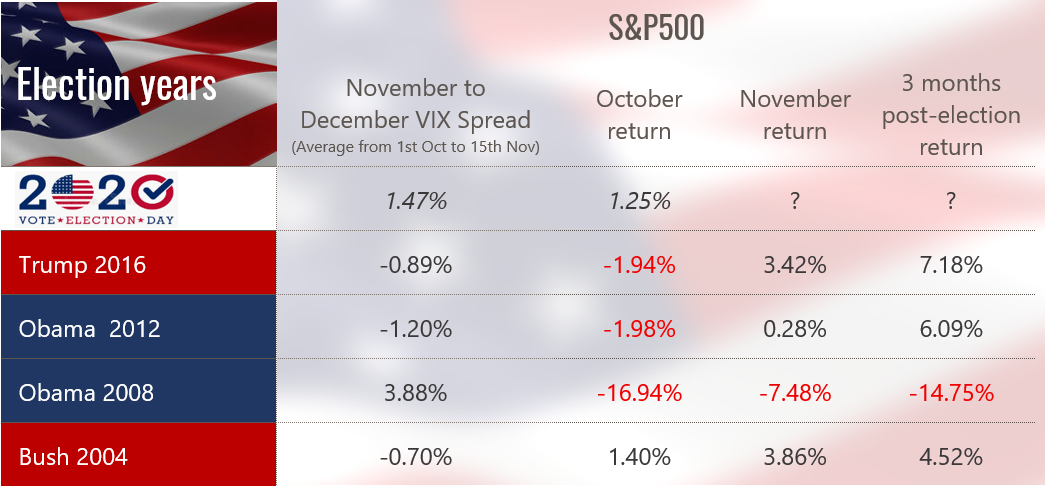09.10.2020
Quel est le prix du risque à l'approche des élections américaines ?

There is no doubt that a US presidential election represents a risk for financial markets and a good way to quantify how much risk is currently priced-in is to look at the forward implied volatility before and after the elections.
For that, the VIX index, a basket of the S&P 500 options volatility, sounds a good barometer.
Looking at the VIX curve, The November expiry is currently trading 1.5% above the December one, reflecting the immediate risk investors are facing post-election (November 3rd) relative to December.
While the 1.5% spread indicates a higher implied risk around and after the election, it does not quantify the absolute level of risk. To put it in perspective, we looked at the average November-December VIX Spread from October 1st to November 15th for every US Election since 2004.
Excluding the US election during the Great Financial Crisis in 2008 where spot volatility was structurally higher than 1, 2 and 3 months forward, it appears that a positive November/December VIX Spread is somewhat unusual. In fact, during the 2004, 2012 and 2016 elections, the November VIX never traded above the December one.
Looking at the return of the S&P in October, November and 3 months after the election, we can observe that it is very difficult to draw any conclusion over a US presidential election from a financial market perspective. If anything and excluding the 2008 election during the crisis, the simple and most direct conclusion would be that a US presidential election after 2000 had a positive impact on the S&P 500 Index one month and 3 months after the outcome.
So how to explain this extra-risk this time? We believe the 1.5% premium in November volatility relative to December likely reflects one single risk: if Biden wins, President Trump might not going to accept it. A sentiment that has been reinforced after the first TV debate of the US elections.
To conclude, history shows that financial markets can easily deal with a republican or democrat president but definitely not with no President after November 4th.
Autres publications
07.01.2026
Outlook 2026 – Après l’année de la 3D, bienvenue dans le scénario des 3R !
Après deux années exceptionnelles pour les marchés, 2026 n’est pas une année d’euphorie – c’est l’année des 3R : Revalorisation, Rotation et Résilience.
Lire plus30.12.2025
Au nom de toute l’équipe de Cité Gestion : Bonne année 2026 !
Alors que l’année 2025 a été particulièrement intense pour le monde financier, nous vous remercions très sincèrement pour votre engagement et la confiance que vous nous accordez.
Lire plus
25.12.2025
Retour sur l'année 2025
En cette journée particulièrement festive, nous souhaitons profiter de l’occasion pour revenir sur les réalisations et les expériences que nous avons partagées tout au long de l’année 2025.
Votre confiance, combinée avec l’engagement de nos collaborateurs, a véritablement fait la différence au cours de cette année.
Nous vous remercions sincèrement et vous souhaitons un très joyeux Noël !
Lire plus16.12.2025
Save the date ! Forum Horizon 29.01.2026
Face aux turbulences économiques globales, quel cap pour la Suisse ?
Nous sommes ravis de perpétuer, pour la 4e année consécutive, notre engagement en tant que partenaire stratégique de cet événement incontournable.
Un grand merci à Le Temps pour le brillant programme de cette 10e édition et à l'IMD pour son accueil de grande qualité.
Détails et billets :
Lire plus10.12.2025
À l’approche des fêtes, nous partageons aujourd’hui notre “wish list 2026”
Non pas une liste de rêves, mais une véritable feuille de route macro-financière pour comprendre ce qui pourrait façonner le prochain cycle.
Lire plus01.12.2025
Retour sur notre événement à la maison de ventes aux enchères Koller !
Découvrez les moments clés et les photos de cet événement inoubliable !
Lire plus